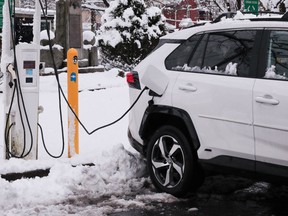The Alberta government says the new levy is equivalent to the amount combustion vehicle drivers pay each year in fuel tax.

Article content
Alberta’s annual tax on electric vehicles, announced in Thursday’s budget release, has gone down like a lead balloon among the province’s EV associations.
The new tax will require EV owners to fork out $200 every year starting Jan. 1, 2025, which the government says is equivalent to the amount combustion vehicle drivers pay each year in fuel. The tax won’t apply to hybrid vehicles.
Advertisement 2
Article content
Article content
Electric vehicles on average weigh more than combustion vehicles, resulting in more wear and tear on Alberta’s roads — all while not contributing to the fuel tax, the province said in its fiscal plan. It said there have been “fairness concerns,” along with challenges with declining fuel tax revenue as a result of increased EV uptake.
“I’m interested in fixing the roads,” Finance Minister Nate Horner told reporters on Thursday. “I think all Albertans would like to do their part in making sure we can maintain our highway infrastructure.”
Alberta’s electric vehicle drivers aren’t trying to skate by with a free ride, said Angie Dean, vice-president of the Tesla Owners Club of Alberta, but they’re looking for a better explanation on how the province came to its decision.
“I think the general sentiment is we all understand we need to pay our fair share,” Dean said. “We just have a lot of questions about how this is happening.”
Because EV adoption in Alberta is still fledgling — the province estimates only 5,000 electric vehicles are currently on the road in Alberta — Dean said phasing in the tax when adoption increases would be more sensible. As the federal government pushes to have 100 per cent of care sales zero-emission vehicles by 2035, Dean said the tax acts as a deterrent for potential buyers.
Article content
Advertisement 3
Article content
“It seems like when we’re in the incentive phase, the province is doing something a little counterintuitive,” she said.

There are better ways to tax electric vehicles, advocates say
Alberta is expecting the EV tax to contribute $1 million to provincial coffers in 2024-25. It’s projecting that number to hit $8 million by 2026-27 due to increased uptake of electric vehicles, which equates to 40,000 electric vehicles being on the road in Alberta by that year.
The provincial fuel tax is meanwhile expected to give Alberta an approximately $1.3 billion boost next year. (The nine-cent-per-litre fuel tax was reimplemented this year after being suspended in 2023.)
Andrew Batiuk, director of the Electric Vehicle Association of Alberta, said electric vehicles tend to weigh more than equivalent combustion vehicles. But the province’s announcement left him wondering why there hasn’t been a push to create a varied tax regime for different sizes of vehicles.
Batiuk said he would’ve been in favour of a more targeted tax on electric vehicles when adoption reaches a certain level.
Advertisement 4
Article content
“The messaging came across less about fairness and revenue, and more about targeting a segment,” Batiuk said.
On Thursday, Finance Minister Horner said the fuel tax amounts to a charge on larger vehicles.
“We do (tax larger vehicles) through the fuel tax,” he said. “But I’d say as Prime Minister (Justin) Trudeau has said, they’re not even going to make gas-powered vehicles after 2035. So we better prepare for the future, I guess, if this is all that’s going to be there to maintain these roads.”
Tesla owner and club leader Dean, who lives in Calgary, said she would have been in favour of applying a tax at all public charging stations, which would incentivize home charging.
“If we were doing an apples-to-apples replacement of the fuel tax, then they should be putting a surcharge or tax on charging, paying a certain rate per kilowatt hour,” Dean said.
“I think it would be a much more fair way to do it.”
Recommended from Editorial
Article content





